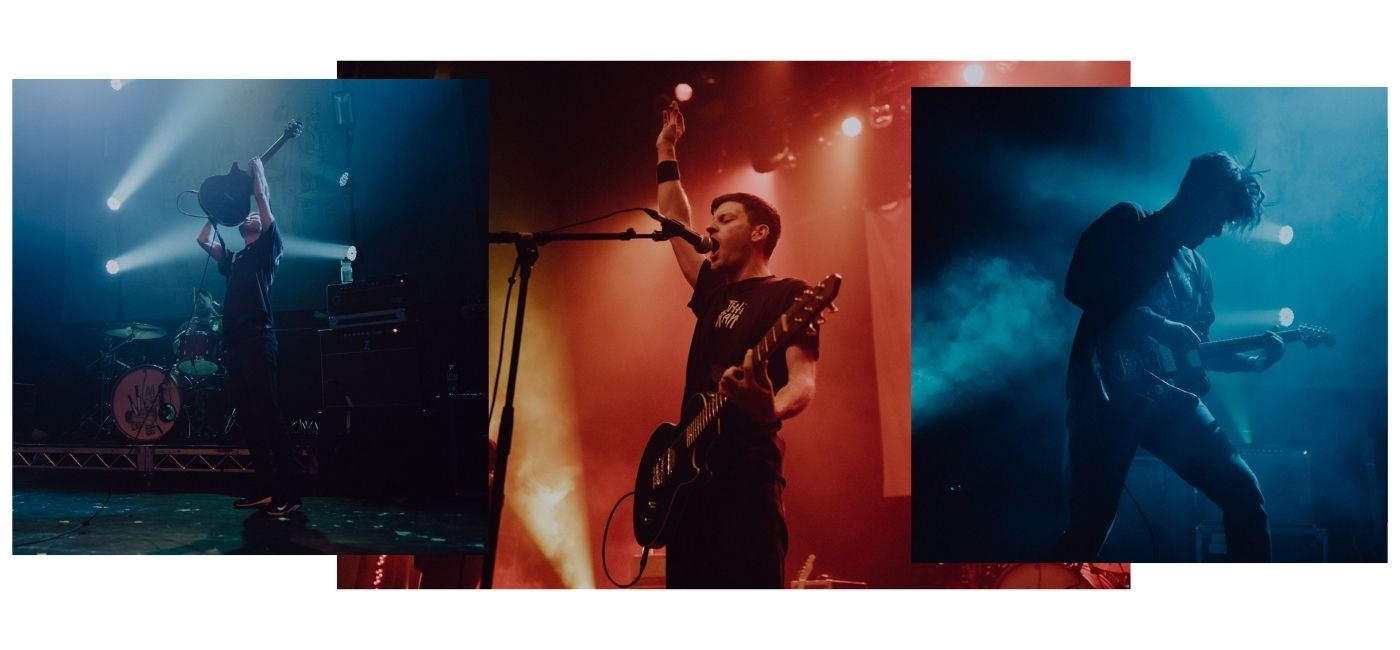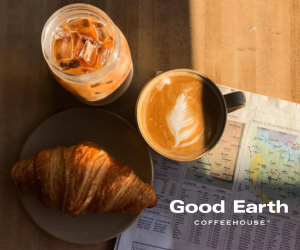PUP Unravel, Rebuild, and Bark Back
The beloved punk band returns rawer and more real than ever with new album, Who Will Look After the Dogs?
By Yasmine Shemesh
Photo by Vanessa Heins
- Published on
When PUP frontman Stefan Babcock was just a 13-year-old kid cruising around Toronto listening to iconic Canadian pop-punk bands like Sum 41 and Gob, he was discovering music that moved him like nothing else had before. Now in his thirties, PUP has recently joined both of these bands on the road for the final leg of Sum 41’s farewell tour, playing big arenas to generations of fans across the country from Victoria to Toronto.
“We’ve been a band that’s just purposely self-sabotaged for years,” Babcock told RANGE in January, when we connected with the band before their show on the second stop of the tour in Vancouver. “There’s something very funny about getting to do this.”

To have been asked by Sum 41 to join that final run in particular was a big honour, “because I know they put a lot of thought into it and it’s important. It’s really cool to just think about,” he added. “You know, yesterday, in Victoria, a bunch of my high school and middle school friends were there and we were just laughing so hard—because those were the songs that introduced us to punk rock and that’s all we would listen to.”
* * *
Parked just down the boulevard from Rogers Arena before the show, the inside of PUP’s tour bus was already buzzing in anticipation of the night ahead. Sitting at the very back of the bus, on the bench seat underneath the large windows away from all the noise, is Babcock. He exhales and smiles. This is the first interview he’s done in about three years—since 2022, when the Toronto punks released their last album, The Unraveling of PUPTheBand—so, he’s naturally also a little nervous, as he admits with a soft laugh.
That particular album cycle had been a real whirlwind for PUP, who had been working hard in the scene for more than a decade already, firmly establishing themselves with acclaimed, award-winning albums like The Dream is Over and Morbid Stuff. The Unraveling of PUPTheBand, with its layers of thundering melodies and squealing horns hurtling towards underlying themes of corporate calamity, was an enormous critical and commercial success. It received rave reviews from everywhere from Pitchfork to the NME, and was both nominated for a Juno Award and shortlisted for the Polaris Music Prize. The band went on tour for a year and a half, performing around Canada, the United States, and Europe. So, what happens next?
“Hopefully, after it unravels, you try and pick up the pieces and get your shit back together,” quips Babcock with a grin.
That unravelled reckoning now comes in the form of a new album, Who Will Look After the Dogs?, arriving May 2. It follows a transformative stretch of time that saw life change on a variety of personal fronts for Babcock and bandmates Nestor Chumak, Zack Mykula, and Steve Sladkowski—children were born, families grew, relationships ended. The first single they released was the dark and explosive “Paranoid,” with lines that delve into the swirling wake of heartbreak, offering a glimpse into the band’s mindset and approach. Babcock started out with his lyrics and a basic riff, which the band then ran with and turned into something he’s incredibly proud of.


“I really love that song,” Babcock says. “I think all of the things I would say I like about PUP—like the heavy parts and the scrappiness, but also the catchiness and the unhinged lyrics and stuff—usually they don’t all coalesce into one song, but I feel like we did it in this one. And I also think there’s a lot of humour.”
That humour specifically refers to the song’s bassline, which borrows from the 1961 doo-wop adaptation of “The Lion Sleeps Tonight” by the Tokens. When Chumak started playing it, Babcock cracked up. “Because the song is really angry, you know? But it’s a very PUP thing for us to write dark songs and then try and take the piss out of them. The songs definitely come from a real place, but then it’s just, like, you have to kind of laugh at it, the situation.”
Later that night at Rogers Arena, PUP hit the stage between Gob and Sum 41, bookended by their childhood heroes on a triple bill that radiated strong early-2000s Warped Tour energy—minus the sunburn. The band was tight and dialed-in, their anthemic choruses lighting up the arena, with Babcock proving once again to be a magnetic frontman. The crowd was massive, a sea of t-shirts repping different eras of all three bands. The atmosphere was nothing short of electric.
* * *
A few weeks later, Babcock is back home in Toronto. The rest of the tour was “really fun,” he says, speaking over Zoom while wearing a Gob t-shirt that he picked up from the band while on tour. Now, Babcock’s sole focus is on Who Will Look After The Dogs?.
The band usually takes about four years to work on an album, but Babcock found himself to be more prolific than ever, writing more than 30 songs in just under a year. Part of it was because he’d been flexing his creative muscles more in general—writing with others outside of PUP, like for Lizzie Killian’s Teens in Trouble project—which offered him a different perspective on his craft.

“When we first started this band, it’s not that I didn’t like writing songs, but I was writing songs so that we could have enough songs to play a set so that we could go on tour,” he says. “And now that we’re older and we’ve been doing it for a while, I’ve just really deeply fallen in love with songwriting. In a way that, now, even though it’s my job more than ever, it just feels like release and relief — and fun. I just feel like a kid when I’m writing.”
One of PUP’s biggest strengths has always been the way they bridge humour with vulnerability, and it’s done especially well on Who Will Look After The Dogs?, from the lyrics themselves to Babcock’s delivery of them—honest, acerbic, and gleefully wry. “The best revenge is living well,” he proclaims on “Best Revenge,” which moves between woozy and clear-eyed pop-rock. “I’ve been living like shit, it’s been fucking up my sleep.”
It comes playfully on songs like “Concrete”—“you seemed pretty disturbed and I was just trying to get down with your sickness,” a fun reference to the 2000 Disturbed hit—as well as in heartbreaking revelations of pain, like on “Hallways,” which features the line the album takes its name from: “I’m losing the will to keep dragging on, but I can’t die yet, ‘cause who will look after the dog?”
“I’m always trying to thread the needle of being earnest and emotional, but also really fun and, at times, funny,” says Babcock. “There’s this thing about taking your craft seriously, but not taking yourself seriously. I’m very serious about songwriting, but I have trouble taking myself too seriously.”
There’s this duality, he continues, where you’re struggling with something, “whether a mental health thing or because of a specific circumstance in your life, and you might be talking to a friend and say something that’s so fucked up and you really believe it and it’s really dark. And then, two months later, when all of that has washed past you, you reflect on what you said and it’s so fucking funny, because it’s over dramatic—or maybe not even over dramatic. It’s just, like, damn, that was a weird headspace to be in and I’m so far removed from that person now. That’s something that I’m always trying to capture—but capture the second part of that, the reflection of, ‘Whoa, I was really hurting, and the way I was acting and thinking and reacting is funny now that I have some space from it.’ I think that’s really just important for all of us to understand. Life’s tough and sad and hard — and it’s fucking funny, too.”
Producer John Congleton, Babcock says, “really got it.” The band would play something a couple times, record it, and move on. It captures the dynamic and raw energy that drives their live show, and allows the songs to speak for themselves. “Olive Garden,” for example, is dynamic and distorted, the tempo moving from jaunty to brutal. “Get Dumber,” featuring Jeff Rosenstock, is all noisy and pummelling and feels like you’ve snuck into the band’s jam space to catch a spontaneous session. With an off-key vocal here, a wrong note and sharp feedback there, it’s deliberately not pristine—it’s real.
“There’s so much imperfection on this record—so much more than anything else we’ve done—in a way that I just really love,” says Babcock. “I just think this record sounds more like the four of us than anything we’ve done before.”

It recalls the feeling of listening to an album that seems perfect because its imperfections not only contribute so much to its character, but have become so ingrained in the listener—like, for Babcock, There’s Nothing Wrong With Love by Built To Spill, his favourite band. You can hear what they’re trying to do, he says, and that they don’t quite nail it somehow makes it even more powerful.
“When I first started listening to that record, when I was 14, somebody burned it for me. There was a scratch on the CD that they gave where it just [went], like, ‘sh-sh-sh,’ at a certain part in one of the songs. And I listened to it so many times that I didn’t notice it anymore. And when I finally bought the record for myself when I had enough money and it wasn’t there, I was like, something’s wrong!” Babcock laughs. “If you love it and consume it a lot, you get so used to those characters—things that give records life and make them feel really genuine and unique and special.”
There have been a few records in Babcock’s life that changed the way he thought about music—“I think any music fan has this,” he notes—whether it was Gob or Built to Spill or progressive ska bands like RX Bandits. Records that took his breath away and subverted any preconceived notions he had about boundaries or structure, proving things don’t have to be perfect to be perfect. Things that left a profound imprint on Babcock—not just as an artist, but as a human being, growing through twofold magic of musical discovery and self-discovery.
“My dream is to make a record that, for kids who are getting into music, it opens a new way of thinking about music for them, like in the way that the first time I heard Built to Spill was,” says Babcock. “I was like, ‘Music is allowed to sound like this?’”
“I don’t claim to think that PUP does that for anybody,” he adds with a laugh. “But it’s my dream to make a record that opens people’s minds to a new way of looking at this genre.”
By Ben Boddez
The Toronto-based pop artist pens an ode to defeating online jealousy that sounds fresh out of the early 2000s.
By Cam Delisle
Just in time for her L.A. Pride debut, the alt-popstar drops the visual for “Versed”—a sweaty anthem that pulses with desire.















